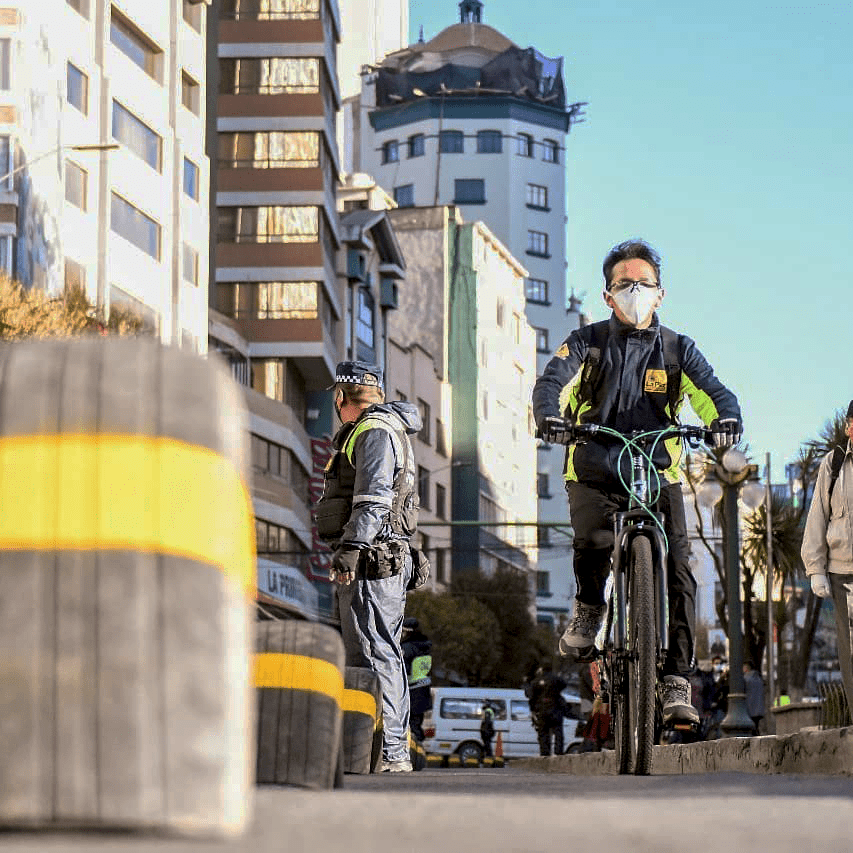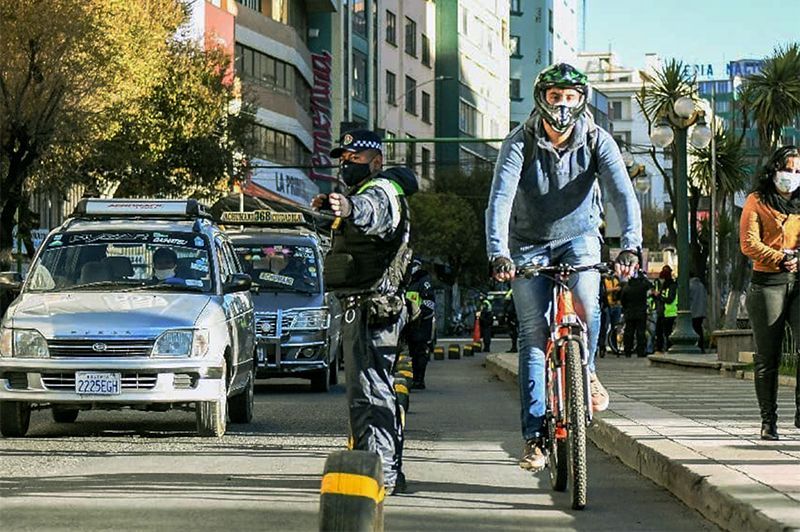The basis for planning was the EUROCLIMA+ project, because a section runs through the infrastructure to be built permanently.
La Paz, Bolivia, July 22, 2020 – In facing the health crisis, the Autonomous Municipal Government of La Paz began the implementation of a cycling infrastructure network, with an extension of 49 kilometres of bicycle path emerging in its first stage and 29 in the second. The basis for the implementation was the pilot project that is part of the EUROCLIMA+ programme.
These types of actions have been carried out by cities around the world to avoid congestion on public transport routes, thereby preventing the spread of COVID-19 in transport, while offering safe, sustainable transport.
“The objective is to implement a temporary bike path to facilitate access to authorised activities, through intermodal connections, preserving physical distancing,” said architect Ximena Cecilia León Villarroel, Head of the Pedestrian and Cyclist Unit of the Municipal Autonomous Government of La Paz.
The first stage will cross four macro-districts of the Bolivian city: Centro, Cotahuma, Periférica and Sur. In the latter, one section crosses almost 3.5 kilometres of the five of the permanent cycling-infrastructure that will be built under the framework of the pilot project “Integrated Planning of the Bicycle Infrastructure Network for the Municipality of La Paz Phase I”, financed by the European Union through the EUROCLIMA+ programme.
At the beginning of this year, the Municipality and the European Union signed a partnership agreement for this project, implemented by the French Development Agency (AFD). This network of temporary bike paths will strengthen the use of bicycles in the area where the permanent infrastructure will be built, which is an early victory for the pilot project, since one of its objectives is to have 500 bike trips daily in the Southern macro-district, an increase of 75%.
On May 11, Bolivia entered into a dynamic quarantine. Before the arrival of the pandemic, La Paz recorded a total of 2.4 million trips per day; however, less than 0.04% were made by bicycle.
With COVID-19, the city will need to move more than 600,000 trips to work per day on public transport, according to estimates by the authorities. That is why, in order to avoid congestion and ensure social distancing, temporary cycling infrastructure will be a safe option for the daily movements of the population.

Segregation signage elements are being made from recycled materials, such as car tires secured to the ground with bolts. The authorities in La Paz carried out a collection campaign that was positively received by the citizens.
“We already have 2,300 tires. The campaign generated empathy in the population, which understands this as a positive step for the implementation of the permanent cycling-infrastructure,” said the official from the Directorate of Integrated Mobility Planning.
In addition, this initiative seeks intermodal connection with public transport (La Paz Bus and Mi Teleférico), so the temporary cycling-infrastructure also aims to install cycle-parking lots to complete the daily trips to the city. Tests have already been carried out during these weeks and implementation is expected to be completed in August.
Finally, the architect León Villarroel commented on how the EUROCLIMA+ programme contributes to the objectives of the Municipality: "It has collaborated in the fulfilment of the objectives of the Plan La Paz 2040 in establishing a sustainable and integrated system of multimodal transport with total coverage, likewise this pilot project is an essential element in improving the planning of mobility for the city of La Paz".
To learn more about the project "Integrated Planning of the Bicycle Infrastructure Network for the Municipality of La Paz Phase I", click on the following link.
About EUROCLIMA+
EUROCLIMA+ is a programme financed by the European Union and co-financed by the Federal Government of Germany through the Federal Ministry for Economic Cooperation and Development (BMZ), as well as by the governments of France and Spain. It aims to reduce the impact of climate change and its effects in 18 Latin American and Caribbean countries by promoting climate change mitigation and adaptation, resilience, and investment. The Programme is implemented under the synergistic work of seven agencies: the Spanish Agency for International Development Cooperation (AECID), the French Development Agency (AFD), the Economic Commission for Latin America and the Caribbean (ECLAC), Expertise France (EF), the International and Ibero-American Foundation for Administration and Public Policy (FIIAPP), the German Society for International Cooperation (GIZ), and UN Environment.
About the French Development Agency
AFD is a public and charitable bank committed to projects that concretely improves the quality of life of populations in developing countries, emerging countries, and overseas territories and collectivities. AFD is active in several sectors - energy, health, biodiversity, water, digital innovation, training- and it accompanies the transition to a safer, fairer, and more sustainable world: a common world. Its action is fully in line with the United Nations' Sustainable Development Goals (SDG). Present in 115 countries through a network of 85 agencies, AFD currently finances, monitors, and supports more than 4,000 development projects. In 2018, AFD invested EUR 11.4 billion in financing projects in developing countries and in overseas territories and collectivities.
For more information:
This email address is being protected from spambots. You need JavaScript enabled to view it.
www.euroclimaplus.org
